 W
WCharles William Adams was a Confederate States Army colonel during the American Civil War. In 1864, he was commander of the Confederate Northern Sub-District of Arkansas, within the Union Army lines. He had the title, although not the formal rank, of "acting brigadier general." He was not officially appointed by Confederate President Jefferson Davis and confirmed by the Confederate States Senate to brigadier general grade, even though some sources identify him as a brigadier general.
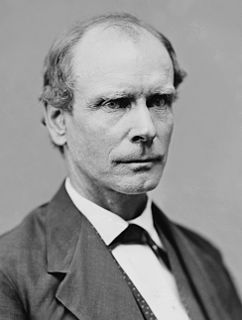 W
WAmos Tappan Akerman was an American politician who served as United States Attorney General under President Ulysses S. Grant from 1870 to 1871. A native of New Hampshire, Akerman graduated from Dartmouth College in 1842 and moved South, where he had most of his career. He first worked as headmaster of a school in North Carolina and as a tutor in Georgia. Having become interested in law, Akerman studied and passed the bar in Georgia in 1850; where he and an associate set up a law practice. He also owned a farm and eleven slaves. When the Civil War started in 1861, Akerman joined the Confederate Army, where he achieved the rank of colonel.
 W
WJames Lusk Alcorn was a Republican governor and a U.S. senator during the Reconstruction of his adopted state of Mississippi.
 W
WSamuel Bard was a United States politician, newspaper editor and served briefly as Governor of Idaho Territory.
 W
WLloyd James Beall was a United States Army officer and paymaster. During the American Civil War, he served as a colonel and as Commandant of the Confederate States Marine Corps. He was the only man to command the Confederate marines throughout the conflict.
 W
WHenry King Burgwyn, Jr. was a Confederate colonel in the American Civil War killed at the Battle of Gettysburg.
 W
WCharles Clark was Governor of Mississippi from November 16, 1863 until May 22, 1865.
 W
WSamuel Cooper was a career United States Army staff officer, serving during the Second Seminole War and the Mexican–American War. Although little-known today, Cooper was also the highest-ranking Confederate general during the American Civil War. After the conflict, he remained in Virginia as a farmer.
 W
WJohn Collins Covell was a 19th-century American educator and school administrator specializing in deaf education in the U.S. states of Virginia and West Virginia.
 W
WJames H. DeVotie (1814–1891) was a Baptist minister in the American South. Born in Oneida County, New York, he was a pastor in South Carolina, Alabama and Georgia. He was a co-founder of Howard College in Marion, Alabama, later known as Samford University near Birmingham. He was a long-time trustee of Mercer University in Macon, Georgia. He served as a Confederate chaplain during the Civil War. After the war, he worked for the Southern Baptist Convention.
 W
WJohnson Kelly Duncan was one of the few generals in the Confederate States Army (CSA) during the American Civil War who was born and raised in the North. An antebellum officer in the U.S. Army, Duncan commanded the Confederate forts defending New Orleans during the Union Navy's successful attacks that led to the fall of the South's largest city.
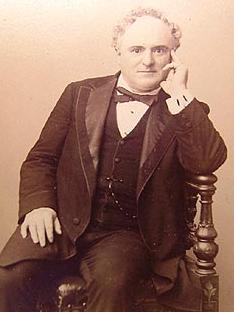 W
WJohn R. Fellows was an American lawyer and politician from Arkansas and New York. He served as New York County District Attorney, and a member of Congress from New York (1891-1893).
 W
WHarris Flanagin was an American politician who served as the 7th governor of Arkansas from 1862 to 1864. Prior to this he served as an officer of the Confederate States Army who commanded an Arkansas mounted rifle regiment in the Western Theater of the American Civil War.
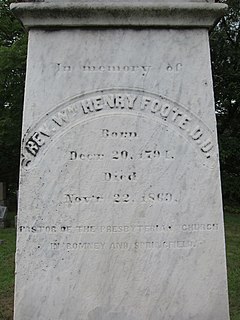 W
WWilliam Henry Foote was an American Presbyterian minister in Virginia and North Carolina. He served as a Confederate chaplain during the American Civil War of 1861-1865. He wrote several books about the history of Presbyterians in the American South.
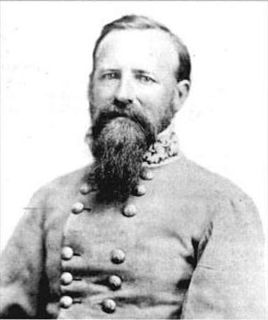 W
WFranklin Kitchell Gardner was a Confederate major general in the American Civil War, noted for his service at the Siege of Port Hudson on the Mississippi River. Gardner built extensive fortifications at this important garrison, 16,000 strong at its peak. At the mercy of conflicting orders, he found himself besieged and greatly outnumbered. His achievement at holding out for 47 days and inflicting severe losses on the enemy before surrendering has been praised by military historians.
 W
WDewitt Clinton Giddings served three non-consecutive terms in the United States House of Representatives as a representative from Texas.
 W
WMajor Lewis Ginter was a prominent businessman, military officer, real estate developer, and philanthropist centered in Richmond, Virginia. A native of New York City, Ginter accumulated a considerable fortune throughout his numerous business ventures and became one of Richmond's wealthiest citizens despite his exceptionally modest demeanor. While the Jefferson Hotel, Lewis Ginter Botanical Garden, and Ginter Park embody some of Ginter's major urban contributions to Richmond, many of his philanthropic gifts were given anonymously to charitable organizations and individuals in need. His continued devotion to Richmond is captured in his famous remark, "I am for Richmond, first and last."
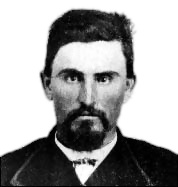 W
WCharles Goodnight, also known as Charlie Goodnight, was an American cattle rancher in the American West, perhaps the best known rancher in Texas. He is sometimes known as the "father of the Texas Panhandle." Essayist and historian J. Frank Dobie said that Goodnight "approached greatness more nearly than any other cowman of history." In 1955, he was inducted into the Hall of Great Westerners of the National Cowboy & Western Heritage Museum.
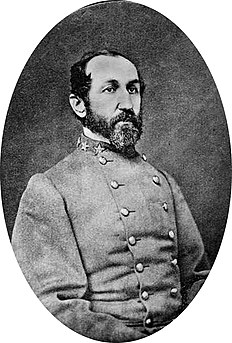 W
WJosiah Gorgas was one of the few Northern-born Confederate generals and was later president of the University of Alabama.
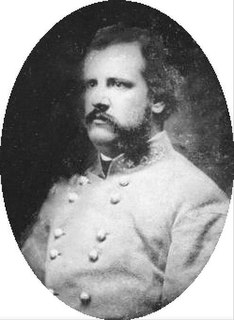 W
WArchibald Gracie III was a career United States Army officer, businessman, and a graduate of West Point. He is well known for being a Confederate brigadier general during the American Civil War and for his death during the Siege of Petersburg.
 W
WIsrael Greene was a member of the United States Marine Corps and the leader of the company of Marines that captured John Brown during his raid at Harpers Ferry. He later left the USMC and served as an officer in the Confederate States Marine Corps during the American Civil War.
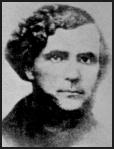 W
WRichard Griffith was a brigadier general in the Confederate States Army during the American Civil War. He was mortally wounded at the Battle of Savage's Station during the 1862 Peninsula Campaign. He was one of a number of Confederate generals who were born in the North in Pennsylvania.
 W
WRobert Hopkins Hatton was a lawyer and politician from Tennessee. He was a state legislator and US Representative, and a Confederate General during the American Civil War.
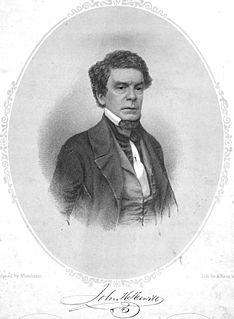 W
WJohn Hill Hewitt was an American songwriter, playwright, and poet. He is best known for his songs about the American South, including "A Minstrel's Return from the War", "The Soldier's Farewell", "The Stonewall Quickstep", and "Somebody's Darling". His output during the American Civil War earned him the epithets "Bard of the Stars and Bars" and "Bard of the Confederacy".
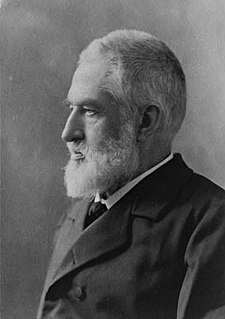 W
WJedediah Hotchkiss, known most frequently as Jed, was an educator and the most famous cartographer and topographer of the American Civil War. His detailed and accurate maps of the Shenandoah Valley are credited by many as a principal factor in Confederate General Stonewall Jackson's victories in the Valley Campaign of 1862.
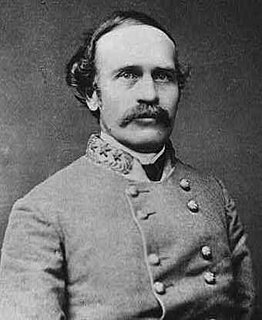 W
WBushrod Rust Johnson was a Confederate general in the American Civil War and an officer in the United States Army. As a university professor he had been active in the state militias of Kentucky and Tennessee and on the outbreak of hostilities he sided with the South, despite having been born in the North in a family of abolitionist quakers. As a divisional commander he managed to evade capture at the Battle of Fort Donelson, but was wounded at the Battle of Shiloh. He served under Robert E. Lee throughout the 10-month Siege of Petersburg, and surrendered with him at Appomattox.
 W
WSydney Smith Lee, called Smith Lee in his lifetime, was an American naval officer who served as a captain in the Confederate States Navy during the American Civil War. He was the third child of Henry "Light Horse Harry" Lee and Anne Hill Carter Lee, and the older brother of Confederate general Robert E. Lee.
 W
WWilliam Miller was an American soldier, attorney, timberman, and politician. He served as a general in the Confederate States Army during the American Civil War. One of the few Northern-born Confederate generals, he led the reserve troops of the state of Florida and helped win one of the South's last victories of the war at the Battle of Natural Bridge.
 W
WWilliam J. Oliphant (1845–1930) was an American Confederate States Army veteran and photographer from Austin, Texas. He published the first photographs of buffalo hunts in North America.
 W
WWilliam Harwar Parker was an officer in the United States Navy and later in the Confederate States Navy. His autobiography, entitled Recollections of a Naval Officer 1841–1865, provides a unique insight into the United States Navy of the mid-19th century during an era when the Age of Sail was coming to an end and the advent of steam power and ironclads was beginning.
 W
WJohn Clifford Pemberton, was a career United States Army officer who fought in the Seminole Wars and with distinction during the Mexican–American War. He resigned his commission to serve as a Confederate Lieutenant-general during the American Civil War. He led the Army of Mississippi from December 1862 to July 1863 and was the commanding officer during the Confederate surrender at the Siege of Vicksburg.
 W
WJames Lord Pierpont was a New England-born songwriter, arranger, organist, Confederate Soldier, and composer, best known for writing and composing "Jingle Bells" in 1857, originally entitled "The One Horse Open Sleigh". He was born in Boston, Massachusetts, and died in Winter Haven, Florida. His composition "Jingle Bells" has become synonymous with the Christmas holiday and is one of the most performed and most recognizable songs in the world.
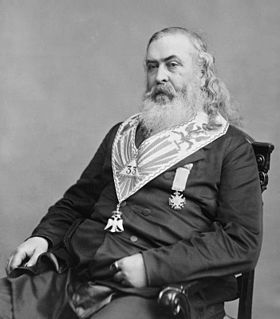 W
WAlbert Pike was an American author, poet, orator, jurist and prominent member of the Freemasons. He was also a senior officer of the Confederate States Army who commanded the District of Indian Territory in the Trans-Mississippi Theater of the American Civil War.
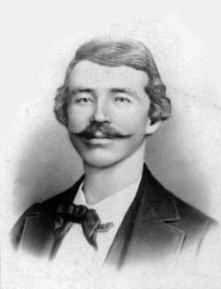 W
WWilliam Clarke Quantrill was a Confederate guerrilla leader during the American Civil War.
 W
WDaniel Harris Reynolds was a Confederate States Army brigadier general during the American Civil War. He was born at Centerburg, Ohio but moved to Iowa, Tennessee and finally to Arkansas before the Civil War. He was a lawyer in Arkansas before the war. After the war, Reynolds resumed his practice of law and was a member of the Arkansas Senate for one term.
 W
WDaniel Ruggles was a Brigadier General in the Confederate States Army during the American Civil War. He is best remembered as a division commander at the Battle of Shiloh.
 W
WCyrus Ingerson Scofield was an American theologian, minister, and writer whose best-selling annotated Bible popularized futurism and dispensationalism among fundamentalist Christians.
 W
WHenry Muchmore Shaw was a Congressional Representative from North Carolina, as well as an officer in the Confederate States Army during the American Civil War. He was killed in action, one of a handful of former U.S. Congressmen to perish during the conflict.
 W
WFrancis Asbury Shoup, a lawyer from Indianapolis, Indiana, became a brigadier general for the Confederate States Army during the American Civil War.
 W
WMartin Luther Smith was an American soldier and civil engineer, serving as a major general in the Confederate States Army. Smith was one of the few Northern-born generals to fight for the Confederacy, as he had served most of his early military career in the South with the United States Army's topographical engineers, marrying a native of Athens, Georgia. He planned and constructed the defenses of Vicksburg.
 W
WWilliam Steele was a career United States Army officer who served with distinction during the Mexican–American War. He later served as a Confederate general during the American Civil War.
 W
WWalter Husted Stevens was a Confederate States Army brigadier general during the American Civil War. He graduated from the United States Military Academy at West Point, New York and served in the corps of engineers, mostly in Louisiana and Texas. He was an engineer for the Army of Northern Virginia. He was reputed to be the last uniformed man to cross the Mayo Bridge during the evacuation of Richmond, Virginia after the Confederate defenses of Petersburg, Virginia collapsed on April 2, 1865. After the Civil War, Stevens became the superintendent and engineer of the Mexican Imperial Railroad. He died of yellow fever at Vera Cruz, Mexico, November 12, 1867.
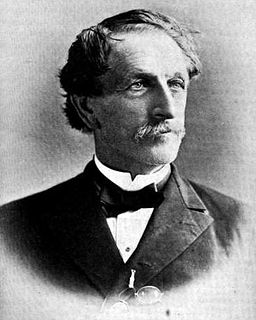 W
WThomas Ringland Stockdale was a U.S. Representative from Mississippi.
 W
WOtho French Strahl was a German American attorney and a brigadier general in the Confederate States Army during the American Civil War. He was one of a small number of Southern generals who were born in the North.
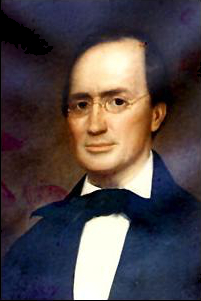 W
WWilliam Tappan Thompson. He co-founded the Savannah Morning News in the 1850s, known then as the Daily Morning News. One of his most notable works was Major Jones's Courtship, an epistolary novel. Thompson's best-known fictional character was Major Joseph Jones.
 W
WNelson Tift was an American jurist, businessman, sailor, and politician who is best known for founding the city of Albany, Georgia.
 W
WDavid Gardiner Tyler, was a U.S. Democratic Party politician and the ninth child and fourth son of John Tyler, the tenth President of the United States.
 W
WChristopher Columbus Upson was a U.S. Representative from Texas.
 W
WHenry Smith Van Eaton was an attorney, politician and military officer, reaching the rank of captain in the Confederate Army. He was elected from Mississippi's 6th congressional district as U.S. Representative, serving 1883 to 1887.
 W
WDr. William McNeill Whistler was an American Confederate soldier and surgeon. He was the younger brother of artist James McNeill Whistler, who painted Whistler's Mother.
 W
WRichard Alsop Wise was an educator and politician from Virginia. He was a U.S. Representative for parts of two terms. He was a son of Henry Alexander Wise, grandson of John Sergeant, brother of John Sergeant Wise, and cousin of George Douglas Wise, all U.S. Representatives.
 W
WJohn Taylor Wood was an officer in the United States Navy and the Confederate Navy. He resigned from the U.S. Navy at the beginning of the American Civil War, and became a "leading Confederate naval hero" as a captain in the Confederate Navy. He was a lieutenant serving aboard CSS Virginia when it engaged USS Monitor in 1862, one of the most famous naval battles in Civil War and U.S. Naval history. He was caught in 1865 in Georgia with Confederate President Jefferson Davis' party, but escaped and made his way to Cuba. From there, he got to Halifax, Nova Scotia, where he settled and became a merchant. His wife and children joined him there, and more children were born in Canada, which is where he lived out the remainder of his life.